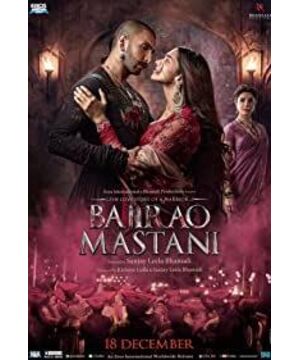. The special effects of the film are pretty good! The scene is quite gorgeous! The costumes are quite elegant! The lines are quite brilliant! The story takes place in the ancient Indian period, which is not very ancient. The male protagonist is typically tall, wealthy and handsome. As a Hindu Brahmin noble, he is brave and intelligent. He inherited his father's mantle and became prime minister. He has never failed in 41 battles in his lifetime. The female protagonist is a public official from a neighboring country. She is typically white and rich. She can sing and dance and is not bad at embroidering her legs. After attacking the male protagonist, it is refreshing (you know Mary Su). It is a pity that the public promulgation followed the mother’s beliefs. She is a Muslim. The religion of the Mughal dynasty who dreams of defeating is the same. But this did not stop the female protagonist from staying with the male protagonist. As the saying goes, "Nothing can stop love", the female protagonist resolutely found the male protagonist's house and wanted to marry him at all costs. The male protagonist’s mother and younger brother discriminated against religion, so they arranged the female protagonist to live in a brothel and treated them as dancers. Ten thousand words are omitted here for singing and dancing. The male protagonist resolutely announced in the rain that he and the female protagonist were married, but the second wife was sad and impatient. Here I want to praise the second woman in particular. She has nothing to say about her character, dignified and generous, and kind-hearted. He informs the male protagonist and rescues the female protagonist who is about to be assassinated. Not only accepts the female protagonist to serve her husband together with herself, but also persuades him in the end. The mother-in-law also accepts the hostess. It's a pity, it's a pity that only the male lead can enjoy a peaceful life when the female lead is there. Once the male lead goes to battle on the battlefield, her good days will come to an end. Here, please pay special attention to the parting words of the two of you! Too beautiful! Continuing, the eldest son of the male protagonist took the initiative to lock up the female protagonist. Although the protagonist had won the battle, he was injured and infected and had a severe fever. When she died, she was still thinking about the heroine. The second woman and her mother-in-law rushed to the barracks to visit the man who died soon, and the second woman forced her mother-in-law to agree to release the heroine. He said that only by releasing the heroine can the heroine be telepathic. It's getting better too (ah~theism of fate), but I didn't expect that the consent form was burned by the son of the stunned male protagonist (there should be a larger grass mud horse here)! The male protagonist returned to the light and went into the water to fight against his imaginary enemy. Personally, he believed that his imaginary enemy should be the so-called feudal ethics at the time, the estrangement of ethnic and national beliefs, and the so-called family relationship that he had always held back. The heroine's heart telepathically senses that the hero is about to leave. At this time, the special effects keep up, showing the scene in their parting words, one word-beauty! Then, under the influence of fate, they left together...
Personally, this film still has some practical significance...For example, today's abnormal social view of marriage and love, such as many unfair treatments in society, and so on. Also, boys shouldn’t give away anything to girls, who knows that in her hometown there is a custom of giving a dagger to be engaged. As a tragic song and dance film, I believe it can strike the hearts of thoughtful judges.
View more about Bajirao Mastani reviews











